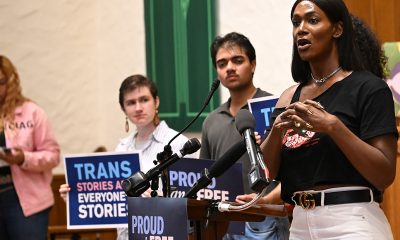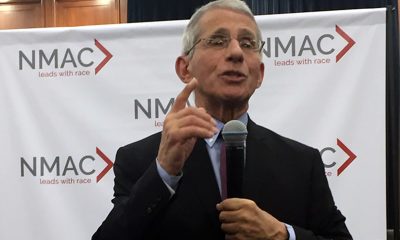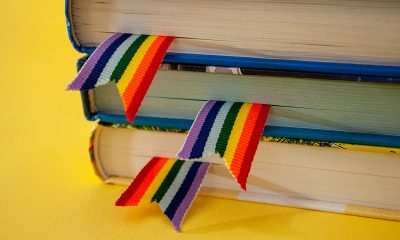Arts & Entertainment
Mark of the ‘Beast’
Novelist Louis Bayard explores Brazil circa 1914 in new adventure
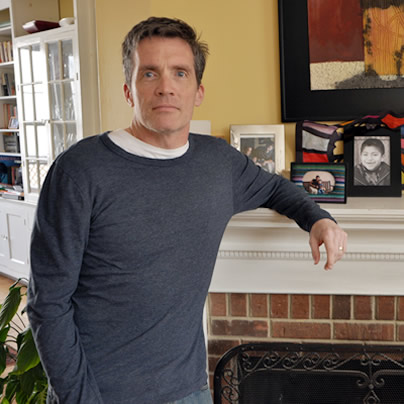
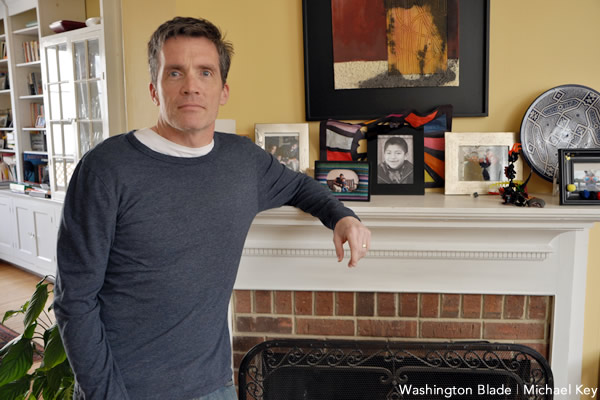
In Louis Bayard’s new novel, Col. Theodore Roosevelt and his son, Kermit, are kidnapped by a mysterious Amazonian tribe in Brazil circa 1914 and must find and kill a ravenous beast to survive. (Washington Blade photo by Michael Key)
‘Roosevelt’s Beast’
By Louis Bayard
Henry Holt and Company
Available March 18
320 pages
Hardcover
$27
Appearances:
Politics & Prose
5015 Connecticut Ave., N.W.
March 23
5 p.m.
One More Page Books
2200 N. Westmoreland St. No. 101
Arlington, VA
March 27
7 p.m.
Listen for Bayard on the “Diane Rehm Show” (WAMU 88.5)
On March 24 at 11 a.m.
Details at louisbayard.com
Washington novelist Louis Bayard, whose new work “Roosevelt’s Beast” will be released Tuesday, spent a whirlwind hour with the Blade two weeks ago touching on everything from how he got started and how his career developed to what he tells young writers in his classes at George Washington University and how he wrestled the “Beast” that is his latest novel.
Bayard, 50, and his partner of 26 years, Don Montuori, are married and have two sons, ages 13 and 11. They live in Capitol Hill. Bayard, born in Albuquerque but raised mostly in Springfield, Va., moved to Washington in 1988, worked on the Hill and later did PR for various environmental groups through the ‘90s. His first novel, the gay-themed “Fool’s Errand,” was published by gay press Alyson Books in 1999. “Roosevelt’s Beast” is his sixth book. He’s not sure how many books he’s sold total, but upon consulting with his publisher, estimates the number to be about 100,000.
His comments have been slightly edited for length.
WASHINGTON BLADE: You went to Princeton and Joyce Carol Oates is quoted on the back of your new book. Did you take her creative writing course?
LOUIS BAYARD: Yes. She was also my adviser.
BLADE: What did you learn from her?
BAYARD: She was a very exacting reader, so it forced me to think about every word I write and I really do sweat every word. You do sometimes start to think over the course of a book, “Does this really matter,” but I revise and review and I think it’s because I had that kind of very hard eye that sniffs out deceit and flabbiness and all the stuff that can go wrong in prose. I don’t recall any specific lesson. I just recall how nice it was to feel understood by somebody of her caliber.
BLADE: Was it a big leap from Alyson to HarperCollins, which published your third book “Mr. Timothy”? How did that play out?
BAYARD: Alyson was one of the few places that would take an un-agented manuscript. The first book was gay-themed and they were a gay publisher so I just thought, “Why not take it straight to them?” It was a good fit for what I was doing. … But then when I had an idea for this book about Tiny Tim (2003’s “Mr. Timothy”), I thought, “I don’t just want this to be plunked on the gay shelf at Borders.” There was that sense of being ghettoized by virtue of being with a gay press. You go on that one shelf in the back of the store. I wanted this out in the front, so I found an agent, finally, after several tries, and he pitched it to the big houses and one of them bit.
BLADE: Would you call that your big break?
BAYARD: I guess you’d call it a break. It seemed like a break at the time. It was a break toward the mainstream, I guess, but I never felt like I’ve left the gay sensibility entirely behind.
BLADE: Do you enjoy teaching?
BAYARD: I do. I wish it paid a little more honestly. I’m there as an adjunct where you’re paid some ridiculous pittance for a lot of work, but I have other income sources. I just teach one fiction writing class.
BLADE: What do you tell your students?
BAYARD: To me, every student is a little different and they all bring something a little different so I just try to create a space where they can experiment and find their own voices. … It’s a workshop, so I’m basically like Socrates there in the midst, throwing out questions and making them think about things.
BLADE: About how many would you say have been good enough to get published?
BAYARD: Of the three years I’ve been doing it, I would say, maybe there were about that many who had the potential to do it. It would really be about desire. Actually the best writer I know of, and I can’t even remember her name offhand, but she was exceptional but actually was the least interested in pursuing it. I kept saying, “You really need to try this,” but she kept saying, “Well, I’m going to Europe” and she had all these plans. She just didn’t seem excited about it. That’s where perseverance pays off as much as anything.
BLADE: You went from gay contemporary fiction into several novels of historical fiction. How did that creative decision come about?
BAYARD: I thought it was an accident when I had this idea to see what became of Tiny Tim, but it achieved a certain amount of success so they kind of wanted me to keep doing that and I’ve come to believe it was a fortuitous accident because it really is the genre that’s most suited to me. I kind of fought it for a while, but now I’ve accepted that I stumbled into the right place.
BLADE: Does writing fiction about people who really lived, like Theodore Roosevelt in your new book, make it seem more real? What is the appeal?
BAYARD: I think there’s both a promise and a challenge that comes with that. People will recognize then name … and perhaps be intrigued as a result, but the challenge is that then you have to make this very well-known character come alive in your own way. It has to be convincing and plausible. You kind of have to work with people’s expectations but also make it a character that lives on the page.
BLADE: Do you have history geeks call you out on minutiae?
BAYARD: Oh yes.
BLADE: What do you say?
BAYARD: Sorry! Old ladies will e-mail me and say something like, “But there were no poinsettias in English drawing rooms in 1842” or “mockingbirds hadn’t migrated as far north as the Hudson Valley by 1830,” and you just go, “Sorry — that’s why I’m a novelist. I get to make things up or change things around if they don’t work.” I try to be as historically accurate as possible, but I think the story’s more important than the history.
BLADE: Is the line between contemporary literature and popular fiction sometimes arbitrary? Where do you feel your books fall on the continuum?
BAYARD: I think of them as sort of a hybrid between literary and genre. I have genre elements, like a mystery or thriller plot, but — what can I say without sounding self regarding? — I do take care with the language and use literary devices. I’m fine with people who just consider them entertainments. I don’t think of them as literature with a capitol L, but I do write to entertain. That’s my first aim. I want it to be a good book, but want you to feel good about yourself the next morning.
BLADE: What’s the gulf like between the two worlds? In music, for instance, there seems to be a pretty sizable gulf between classical and pop.
BAYARD: I think the gulf is narrowing because we’re seeing people like Michael Chabon and Colson Whitehead who are literary figures but who are also very deliberately writing in genre and I love the idea of breaking down that wall because I think it’s a silly distinction. I’m thinking of Richard Price who has written these great crime novels set in New York like “Clockers” and “Lush Life.” They’re police procedurals, they’re genre, but they’re such brilliant dissections of our society and they’re so ambitious, so beautifully crafted. The dialogue is extraordinary and I think he should be considered a literary artist.
BLADE: You wrote two gay-themed contemporary novels set in Washington. What kind of reactions did you get? Did people assume they were roman a clefs?
BAYARD: I guess there was a little bit of that assumption.
BLADE: But you had a sense that people outside of your acquaintance circle were reading and enjoying them?
BAYARD: I think so. Periodically I hear from them. “Fool’s Errand” seems to have a very small but enthusiastic cult. There may only be 12 of them but I hear from them on the order of once a year or so. They were conceived as entertainments so I didn’t expect them to be embraced as the next coming of Edmund White or something. I did worry that when I moved onto other things, that it would be seen as turning my back on gay readers and gay bookstores.
BLADE: Did anybody float that theory to you?
BAYARD: No, I probably projected it onto them. I maintain that my books since then still have a gay vibe and I’ve had gay characters in other books. Kermit Roosevelt in this new book isn’t gay, but he’s not really about heteronormative ideals. I don’t write about he-men.
BLADE: Was there a sense that you started out writing what you knew, then graduated onto tougher projects?
BAYARD: Oh, that’s interesting. “Fool’s Errand” required zero research. I just drew from my own life and my friends’ lives. “Mr. Timothy” was really the first book where I had to come up with a whole other world, but it was a challenge I wanted to embrace. There’s only so much you can squeeze out of your own life and I’m pretty quiet honestly. Not a lot of drama.
BLADE: How do you deem success for these various projects? Is there a sales threshold you like to hit?
BAYARD: To me, success is earning back the advance they give me.
BLADE: Now that you have several under your belt, do you feel freer to experiment? The book world seems like a jungle these days. Do you have any sense that if you wrote something that bombed, they would give you another shot?
BAYARD: No, I don’t think they would. This was the second of a two-book deal so after this I’m a free agent.
BLADE: So do you feel a lot of pressure?
BAYARD: The pressure is that I want to keep doing this indefinitely so I feel obliged to get a certain number of nice critical reviews and sell a certain amount. But there are plenty of mid-list writers who earn back their advances and are doing everything they need to do but are being dropped from publishing houses. It’s a little scary. The whole business is contracting. They seem to want more high concept stories — you know, werewolves and vampires and what not. Zombies. So you do sort of feel you’re dancing as fast as you can most of the time.
BLADE: Sounds nerve wracking.
BAYARD: It is, but it’s the business too, not just authors. Publishers are shit scared and nobody knows anything. Which can be freeing in a way. You think, “Well, I may not know anything, but I know as much as they do.” What’s commercial? Nobody expected “The Da Vinci Code” to become the monster hit that it became, so I don’t know. It’s a weird time.
BLADE: Where does the drive come from? Did you always want to do this?
BAYARD: Oh, I’ve known since I was 10 on some level.
BLADE: What was the appeal?
BAYARD: Well, every writer starts as a reader. I loved reading from an early age, though my kids don’t. I always have and it’s the thing I love more than anything. So you start as a reader then you realize you want to create the same effect on someone else that these writers did on you. It was really in high school that I first started finding a voice of some kind. … My first credits were in gay magazine called Genre. Are they still around?
BLADE: Well, it’s funny you should mention that. (Editor’s note:Genre and Washington Blade previously had the same owners.)
BAYARD: Eventually my first novel came out and kind of went nowhere and there were a couple years where I wasn’t writing much at all, but there was always part of me that kept coming back to this. I think the surest test of a vocation is that you keep going forward even in the face of rejection. Even if it’s not clear that anybody in the world wants to read what you write.
BLADE: How tedious is the actual process? Are there points along the way you want to rip your hair out or is there joy in the problem solving?
BAYARD: Both. It’s an unstable compound of all those things. I wish it got easier. I used to think it would, but it really doesn’t.
BLADE: What’s the most common mistake you see in your students?
BAYARD? A lot of them are very entranced with words. They’re just discovering word power so they write these amazing, gorgeous, beautiful sentences. … A young writer throws everything at you because they want to impress and stun and overwhelm but. As I get older, I’m realizing you need less and less. Oddly enough, they neglect story. It’s amazing how many of them don’t know what their story is.
BLADE: Lots of authors might have one or two good books in them, but to keep doing this over many years is quite a feat. Yet it seems you’re heading down that path. Was there a point you felt you’d turned a corner?
BAYARD: Oh, I never feel I’ve made it. Yes, there are things that might look like success, but for me, it’s a constantly moving goalpost. I used to say all I wanted was to get reviewed in the New York Times. My second book was, but then I ended up in a depressive tailspin the week after. It’s a hard thing to chase because you never feel completely successful.
BLADE: What’s next?
BAYARD: Probably a young-adult novel set in the Great Depression. That’s about all I can say. It would be another jump, but it’s the only growth sector in publishing. I’m reading a lot of young-adult stuff and I’ve been very impressed by the quality. Some of it’s really excellent.
Photos
PHOTOS: Montgomery County Pride in the Plaza
LGBTQ celebration held in downtown Silver Spring

Montgomery County Pride in the Plaza was held on Sunday, June 29 at Veterans Plaza in Silver Spring, Md.
(Washington Blade photos by Michael Key)























The fifth annual Fredericksburg Pride march and festival was held on Saturday, June 28. A march through the streets of downtown Fredericksburg, Va. was followed by a festival at Riverfront Park.
(Washington Blade photos by Michael Key)



















India
Anaya Bangar challenges ban on trans women in female cricket teams
Former Indian cricketer Sanjay Bangar’s daughter has received support

Anaya Bangar, the daughter of former Indian cricketer Sanjay Bangar, has partnered with the Manchester Metropolitan University Institute of Sport in the U.K. to assess her physiological profile following her gender-affirming surgery and undergoing hormone replacement therapy.
From January to March 2025, the 23-year-old underwent an eight-week research project that measured her glucose levels, oxygen uptake, muscle mass, strength, and endurance after extensive training.
The results, shared via Instagram, revealed her metrics align with those of cisgender female athletes, positioning her as eligible for women’s cricket under current scientific standards. Bangar’s findings challenge the International Cricket Council’s 2023 ban on transgender athletes in women’s cricket, prompting her to call for a science-based dialogue with the Board of Control for Cricket in India and the ICC to reform policies for transgender inclusion.
“I am talking with scientific evidence in my hand,” Bangar said in an interview posted to her Instagram page. “So, I hope, this makes an impact and I will be hoping to BCCI and ICC talking with me and discussing this further.”
On Nov. 21, 2023, the ICC enacted a controversial policy barring trans women from international women’s cricket. Finalized after a board meeting in Ahmedabad, India, the regulation prohibits any trans player who has experienced male puberty from competing, irrespective of gender-affirming surgery or hormone therapy. Developed through a 9-month consultation led by the ICC’s Medical Advisory Committee, the rule aims to safeguard the “integrity, safety, and fairness” of women’s cricket but has drawn criticism for excluding athletes like Canada’s Danielle McGahey, the first trans woman to play internationally. The policy, which allows domestic boards to set their own rules, is slated for review by November 2025.
Bangar shared a document on social media verifying her participation in a physiological study at the Manchester Metropolitan University Institute of Sport, conducted from Jan. 20 to March 3, 2025, focused on cricket performance. The report confirmed that her vital metrics — including haemoglobin, blood glucose, peak power, and mean power — aligned with those of cisgender female athletes. Initially, her fasting blood glucose measured 6.1 mmol/L, slightly above the typical non-diabetic range of 4.0–5.9 mmol/L, but subsequent tests showed it normalized, reinforcing the study’s findings that her physical profile meets female athletic standards.
“I am submitting this to the BCCI and ICC, with full transparency and hope,” said Bangar. “My only intention is to start a conversation based on facts not fear. To build space, not divide it.”
In a letter to the BCCI and the ICC, Bangar emphasized her test results from the Manchester Metropolitan University study. She explained that the research aimed to assess how hormone therapy had influenced her strength, stamina, haemoglobin, glucose levels, and overall performance, benchmarked directly against cisgender female athletic standards.
Bangar’s letter to the BCCI and the ICC clarified the Manchester study was not intended as a political statement but as a catalyst for a science-driven dialogue on fairness and inclusion in cricket. She emphasized the importance of prioritizing empirical data over assumptions to shape equitable policies for trans athletes in the sport.
Bangar urged the BCCI, the world’s most influential cricket authority, to initiate a formal dialogue on trans women’s inclusion in women’s cricket, rooted in medical science, performance metrics, and ethical fairness. She called for the exploration of eligibility pathways based on sport-specific criteria, such as haemoglobin thresholds, testosterone suppression timelines, and standardized performance testing. Additionally, she advocated for collaboration with experts, athletes, and legal advisors to develop policies that balance inclusivity with competitive integrity.
“I am releasing my report and story publicly not for sympathy, but for truth. Because inclusion does not mean ignoring fairness, it means measuring it, transparently and responsibly,” said Bangar in a letter to the BCCI. “I would deeply appreciate the opportunity to meet with you or a representative of the BCCI or ICC to present my findings, discuss possible policy pathways, and work towards a future where every athlete is evaluated based on real data, not outdated perceptions.”
Before her transition, Bangar competed for Islam Gymkhana in Mumbai and Hinckley Cricket Club in the U.K., showcasing her talent in domestic cricket circuits. Her father, Sanjay Bangar, was a dependable all-rounder for the Indian national cricket team from 2001 to 2004, playing 12 test matches and 15 One Day Internationals. He later served as a batting coach for the Indian team from 2014 to 2019, contributing to its strategic development.
Cricket in India is a cultural phenomenon, commanding a fanbase of more than 1 billion, with more than 80 percent of global cricket viewership originating from the country.
The International Cricket Council, the sport’s governing body, oversees 12 full member nations and more than 90 associate members, with the U.S. recently gaining associate member status in 2019 and co-hosting the 2024 ICC Men’s T20 World Cup. The BCCI generated approximately $2.25 billion in revenue in the 2023–24 financial year, primarily from the Indian Premier League, bilateral series, and ICC revenue sharing. The ICC earns over $3 billion from media rights in India alone for the 2024–27 cycle, contributing nearly 90 percent of its global media rights revenue, with the BCCI receiving 38.5 percent of the ICC’s annual earnings, approximately $231 million per year.
Women’s cricket in India enjoys a growing fanbase, with over 300 million viewers for the Women’s Premier League in 2024, making it a significant driver of the sport’s global popularity. The International Cricket Council oversees women’s cricket in 12 full member nations and over 90 associate members, with the U.S. fielding a women’s team since gaining associate status in 2019 and competing in ICC events like the 2024 Women’s T20 World Cup qualifiers. The BCCI invests heavily in women’s cricket, allocating approximately $60 million annually to the WPL and domestic programs in 2024–25, while contributing to the ICC’s $20 million budget for women’s cricket development globally. India’s media market for women’s cricket, including WPL broadcasting rights, generated $120 million in 2024, accounting for over 50 percent of the ICC’s women’s cricket media revenue.
“As a woman, I feel when someone says that they are women, then they are, be trans or cis. A trans woman is definitely the same as a cis woman emotionally and in vitals, and specially, when someone is on hormone replacement therapy. Stopping Anaya Bangar from playing is discrimination and violation of her rights. It is really sad and painful that every transwoman need to fight and prove their identity everywhere,” said Indrani Chakraborty, an LGBTQ rights activist and a mother of a trans woman. “If ICC and BCCI is stopping her from playing for being transgender, then I will say this to be their lack of awareness and of course the social mindsets which deny acceptance.”
Chakraborty told the Blade that Bangar is an asset, no matter what. She said that the women’s cricket team will only benefit by participation, but the discriminating policies are the hindrance.
“Actually the transgender community face such discrimination in every sphere. In spite of being potent, they face rejection. This is highly inhuman. These attitudes is regressive and will never let to prosper. Are we really in 2025?,” said Chakraborty. “We, our mindset and the society are the issues. We, as a whole, need to get aware and have to come together for getting justice for Anaya. If today, we remain silent, the entire community will be oppressed. Proper knowledge of gender issues need to be understood.”
The BCCI and the International Cricket Council have not responded to the Blade’s repeated requests for comment.
-

 U.S. Supreme Court4 days ago
U.S. Supreme Court4 days agoSupreme Court upholds ACA rule that makes PrEP, other preventative care free
-

 U.S. Supreme Court4 days ago
U.S. Supreme Court4 days agoSupreme Court rules parents must have option to opt children out of LGBTQ-specific lessons
-

 Television4 days ago
Television4 days ago‘White Lotus,’ ‘Severance,’ ‘Andor’ lead Dorian TV Awards noms
-

 Music & Concerts4 days ago
Music & Concerts4 days agoBerkshire Choral to commemorate Matthew Shepard’s life

